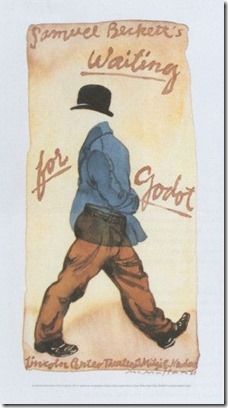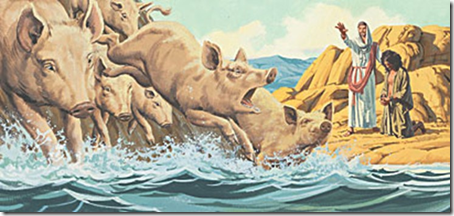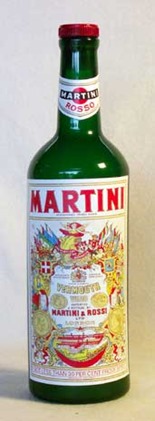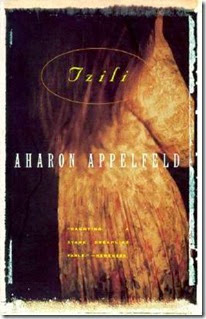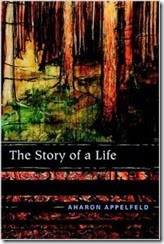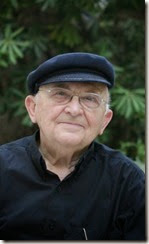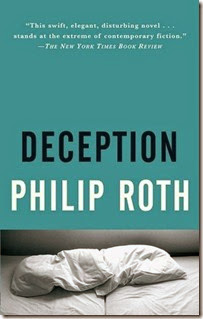
I write fiction and I'm told it's autobiography. I write autobiography and I'm told it's fiction, so since I'm so dim and they're so smart, let them decide. – Philip Roth
, Deception
This year I’ve been actively seeking out novels written in dialogue so it was only a matter of time before I got to Philip Roth’s 1990 novella Deception. Having read several books by him—Indignation, The Prague Orgy, Nemesis, The Ghost Writer, The Dying Animal, The Humbling and Everyman—I thought I had a pretty good idea what to expect here but this was something very different.
I’ve never been one of those writers who plunders his real life for ideas. Whenever I think about it I reflect on the scene in Hannah and her Sisters where Hannah gets upset with Holly because it’s obvious that Holly’s book is all about her family and contains things about Hannah’s marriage that Holly really shouldn’t have been privy to:
Hannah: I'm upset about what you wrote.
Holly: My script?
Hannah: It's based on Elliot and me.
Holly: Loosely.
Hannah: Not loosely. Real specifically. Is that how you see us? Can I not accept gestures and feelings from people? Do I put people off?
Holly: It's a made-up story.
Hannah: No, it's exact. The situations, the dialogue, everything. It's full of details about Elliot and me... which I don't see how you could know about.
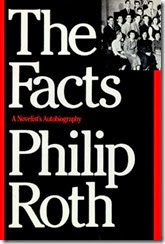 A writer’s just asking for trouble when he does that. And yet so many of us do. Even great writers like Philip Roth apparently. Or do they? On the surface the male protagonist in this book appears to be a thinly-disguised version of Roth. He’s even called Philip and this ‘Philip’ is the author of books where the main character is a certain Nathan Zuckerman. That really should settle it: this is biography, or—let’s do the man a favour—semi-autobiography. Roth opens his actual autobiography The Facts: A Novelist's Autobiography as follows:
A writer’s just asking for trouble when he does that. And yet so many of us do. Even great writers like Philip Roth apparently. Or do they? On the surface the male protagonist in this book appears to be a thinly-disguised version of Roth. He’s even called Philip and this ‘Philip’ is the author of books where the main character is a certain Nathan Zuckerman. That really should settle it: this is biography, or—let’s do the man a favour—semi-autobiography. Roth opens his actual autobiography The Facts: A Novelist's Autobiography as follows:
Dear Zuckerman,
In the past, as you know, the facts have always been notebook jottings, my way of springing into fiction. For me, as for most novelists, every genuine imaginative event begins down there, with the facts, with the specific, and not with the philosophical, the ideological, or the abstract. Yet, to my surprise, I now appear to have gone about writing a book absolutely backward, taking what I have already imagined and, as it were, desiccating it, so as to restore my experience to the original, prefictionalised factuality. Why? To prove that there is a significant gap between the autobiographical writer that I am thought to be and the autobiographical writer that I am? To prove that the information that I drew from my life was, in the fiction, incomplete? If that was all, I don’t think I would have gone to the trouble, since thoughtful readers, if they were interested enough to care, could have figured as much for themselves.
The reality of Deception is that Roth did work in a studio flat in London’s Notting Hill. At the time of writing the book Roth was in a long-term relationship with the British actress Claire Bloom (they first met in 1966) who he ended up marrying (in 1990 shortly after he finished Deception—notably Bloom proposed to Roth). They also ended up divorcing most acrimoniously a few years later. In the book there’s a conversation between the writer ‘Philip’ and his wife (who, in early drafts had been named ‘Claire’) where she’s discovered his notebook and questions him regarding the contents: just how fictional was his fiction? It’s a good question and one that hovers over this book. The wife accuses him of having an affair. She’s read the novel he’s been working on (which is ‘Philip’s’ version of Roth’s The Counterfile) and feels she knows the Englishwoman there but, she says, “this is not that English woman, this is not the model for that English woman, this is the real woman! Don’t pretend they are one and the same.” ‘Philip’ says he doesn’t:
One is a figure sketched in conversation in a notebook, the other is a major character entangled in a plot of an intricate book. I have been imagining myself, outside of my novel, having a love affair with a character inside my novel.
This, of course, is not dissimilar to the defence provide by Humbert Humbert in Lolita when Charlotte Haze finds his journal in which he’s recorded his feelings for her daughter:
Let us be civilized people. It is all your hallucination. You are crazy, Charlotte. The notes you found were fragments of a novel. Your name and hers were put in by mere chance. Just because they came handy. Think it over. I shall bring you a drink.
Roth’s autobiography (written in 1988 by the way) is interesting because as you might’ve noticed a) it’s addressed to a fictional character, his alter ego Nathan Zuckerman, but also because b) we get to read Zuckerman’s critique of Roth’s book. He says:
Dear Roth,
I’ve read the manuscript twice. Here is the candour you ask for: Don’t publish—you are far better off writing about me than “accurately” reporting your own life. Could it be that you’ve turned yourself into a subject not only because you’re tired of me but because you believe I am no longer someone through whom you can detach yourself from your biography at the same time that you exploit its crises, themes, tensions, and surprises? Well, on the evidence of what I’ve just read, I’d say you’re still as much in need of me as I of you—and that I need you is indisputable.
[…]
What you choose to tell in fiction is different from what you’re permitted to tell when nothing’s being fictionalized, and in this book you are not permitted to tell what it is you tell best: kind, discreet, careful—changing people’s names because you’re worried about hurting their feelings—no, this isn’t you at your most interesting. In the fiction you can be so much more truthful without worrying all the time about causing direct pain.
 Odd that after writing this book he would then produce a novella like Deception. Or maybe not so odd. Supposedly the first step to recovery for an addict is admitting to themselves (as well as others) that they’re an addict. But that admission isn’t a cure-all in itself because there are plenty of addicts who know they’re addicts but just keep right on flushing their lives down the pan. Roth acknowledges in his biography what he’s like and then keeps right on doing it. And one can’t say that Bloom didn’t know what she was getting into. Her first letter to Roth included praise for his novel My Life as a Man, a warts and all account of his what Morris Dickstein in his review for the New York Times calls Roth’s “operatically unhappy” first marriage. It was clearly only a matter of time before Roth turned his talent on her. In her own kiss-and-tell autobiography, Leaving a Doll's House, Bloom writes:
Odd that after writing this book he would then produce a novella like Deception. Or maybe not so odd. Supposedly the first step to recovery for an addict is admitting to themselves (as well as others) that they’re an addict. But that admission isn’t a cure-all in itself because there are plenty of addicts who know they’re addicts but just keep right on flushing their lives down the pan. Roth acknowledges in his biography what he’s like and then keeps right on doing it. And one can’t say that Bloom didn’t know what she was getting into. Her first letter to Roth included praise for his novel My Life as a Man, a warts and all account of his what Morris Dickstein in his review for the New York Times calls Roth’s “operatically unhappy” first marriage. It was clearly only a matter of time before Roth turned his talent on her. In her own kiss-and-tell autobiography, Leaving a Doll's House, Bloom writes:
Almost immediately I came upon a passage about the self-hating Anglo-Jewish family with whom he lives in England. Oh well, I thought, he doesn't like my family. There was a description of his working studio in London, letter-perfect and precise. Then I reached the depictions of all the girls who come over to have sex with him—in the most convoluted positions, preferably on the floor. As Philip always insisted that the critics were unable to distinguish his self-invention from his true self, I mindfully accepted these Eastern European seductresses as part of his "performance" as a writer; but I was not so certain. Finally, I arrived at the chapter about his remarkably uninteresting, middle-aged wife, who, as described, is nothing better than an ever-spouting fountain of tears constantly bemoaning the fact that his other women are so young. She is an actress by profession, and—as if hazarding a guess would spoil the incipient surprise lying in store—her name is Claire.
As it is she actually gets off fairly light. The character of the wife only appears in one chapter of the book where she challenges him after flicking though his notebook and ‘Philip’ ends up storming out of the house. “The only woman in my studio,” asserts ‘Philip’, “is the woman in my novel. It would be nicer with company but it doesn’t work that way.” The wife isn’t convinced:
‘How can she be imaginary when she knows all these things you couldn’t possibly know? She is someone who comes to your studio and she is why you have been so distracted and totally uninterested in me now for months.’
The defence calls James Ellroy (from an interview with Chris Harvey):
Ellroy, one suspects, is just glad to be back with the characters he loves: “I wanted to know these people again, because they’re so stunningly real to me, and with all but a few cases in my personal life, maybe just one case in Helen Knode, they’re more real to me than the real people I’ve known.” He slips into an imagined reunion with them: “I’ve missed ya. Hey. I love ya. I’m back. You’re doing this crazy s--- at the beginning of World War II. Hey, Dudley, you’re an opium addict, bet you didn’t know that, hey Dud? Hey, but you f--- Bette Davis, how bad can it be?” [bold mine]
Try typing into Google “more real to me than” and see how many writers have said something similar to the above.
Going back to My Life as a Man it’s worth looking at how it’s structured. As Wikipedia puts it:
The work is split into two sections: the first section, "Useful Fictions," consisting of two short stories about a character named Nathan Zuckerman, and the second section, "My True Story," which takes the form of a first-person memoir by Peter Tarnopol, a Jewish writer who authored the two stories in the first section.
Deception isn’t nearly as complex but we’re still faced with the ethical issue: what right does an author have to cannibalise the lives of his family and friends? At one point his (fictitious?) ex-lover says to ‘Philip’: “All the time I thought you loved me for my body when in fact it was only for my sentences.” This is some time after this ‘Philip’ has published his version of Deception (although the book is never named) and she’s calmed down enough to phone him. She’s been mad with him—furious—and so Roth would’ve known how Bloom would’ve been likely to react when he finally handed her the manuscript of Deception to read. Perhaps this is why he (uncharacteristically, apparently) waited several weeks to show it her. Interestingly the e-book I read doesn’t have the usually disclaimer saying all the characters contained within are works of fictions and any similarities to persons living or dead is purely coincidental.
Fiction is deception. Writers are liars. For some perverse reason we think telling lies is a way to get to the truth while it’s got its knickers down and Roth is no exception. Metafiction is deception squared. And one of the primary goals of metafiction is to look at the craft of the writer. I wrote a poem once called ‘Salome’:
SALOME
"I thought you'd be pleased," she said
when she presented me
with the typescript of our conversation.
Well I was, in a way, flattered at least,
but I'd never intended
what I'd said to have such permanence.
Better such things to be viewed
through the veil of memory.
29 October 1989
and when I showed it to the girl who’d inspired it—unusually I hadn’t dedicated the poem to her which is odd because I was quite besotted by her—she was appalled at the thought that I might’ve recorded the things we’d shared, not flattered, not in the least. I can only imagine her face if I ever did choose to write about our relationship because we haven’t spoken in almost twenty-five years.
 Poets especially suffer from readers’ inability to distinguish between fact and fiction. As soon as you put ‘I’ in a poem then immediately the poem’s all about you and they feel cheated—lied to and not in a good way—if they learn you made the whole thing up. This is what Roth says in The Counterlife:
Poets especially suffer from readers’ inability to distinguish between fact and fiction. As soon as you put ‘I’ in a poem then immediately the poem’s all about you and they feel cheated—lied to and not in a good way—if they learn you made the whole thing up. This is what Roth says in The Counterlife:
It’s all impersonation—in the absence of a self, one impersonates selves, and after a while impersonates the best the self that best gets one through... What I have instead is a variety of impersonations I can do, and not only of myself—a troupe of players that I have internalised, a permanent company of actors that I can call upon when a self is required, an ever-evolving stock of pieces and parts that forms my repertoire... I am a theatre, nothing more than a theatre.
In his biography, again, Roth writes (well, Zuckerman responds):
What one chooses to reveal in fiction is governed by a motive fundamentally aesthetic; we judge the author of a novel by how well he or she tells the story. But we judge morally the author of an autobiography, whose governing motive is primarily ethical as against aesthetic. How close is the narration to the truth? Is the author hiding his or her motives, presenting his or her actions and thoughts to lay bare the essential nature of conditions or trying to hide something, telling in order not to tell? In a way we always tell in order also not to tell, but the personal historian is expected to resist to the utmost the ordinary impulse to falsify, distort, and deny. Is this really “you” or is it what you want to look like to your readers at the age of fifty-five? You tell me in your letter that the book feels like the first thing you have ever written “unconsciously.” Do you mean that The Facts is an unconscious work of fiction? Are you not aware yourself of its fiction-making tricks?
Did Philip Roth have an affair with an English woman over a period of several years? Does it matter? Come to think of it did the conversations with the two Czechoslovakian women, the Polish woman and the male Czech expatriate take place exactly as recorded in the book? Or at all? Are they more or less likely to be fiction? And what about the ex-mistress with cancer, or the other ex-mistress (and ex-student) who has had shock treatment? I assumed these were the Englishwoman—I was deceived—but apparently not.
That Deception might feel more like notes for a novel rather than a finished novel is, I’m sure, no coincidence. That his partner would get upset by what she read in the novel comes as no surprise since his character’s wife gets upset by what she reads in his notebook; this is life imitating art. I wonder if Roth would’ve been disappointed, felt he’d somehow failed, if Claire Bloom hadn’t batted an eye when she read his book? So what is it? A novel pretending to be a notebook or a notebook pretending to be a novel?
The final chapter of this book poses a problem. If ‘Philip’s’ notebook comprises the chapters preceding the one where his wife confronts him then what’s happening in the final chapter? I can see two ways of reading this, either the Englishwoman was real and this is a final conversation or, inspired by his wife’s reaction to the notebook, this is a final chapter imagining a pleasanter encounter with the Englishwoman after she has read about herself in the novel ‘Philip’s’ written.
One of the big problems with a dialogue novel is how to distinguish who is talking. In Me & You Powell presents us with two interchangeable characters—it doesn’t matter which one’s which—and in Your Fathers, Where Are They? And the Prophets, Do They Live Forever? Eggers changes location—Buildings 52, 53 and so 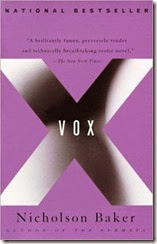 on—and we quickly learn who’s chained up in each building but in Deception Roth shows little regard for his readers and I was lost at the start of every chapter and I was not alone (see Fay Weldon’s comments in the next paragraph). I’d assumed that the book would only contain two people—I was expecting a version of Nicholson Baker’s Vox—but, no, there’re all these Czechs popping up; there’s a whole chunk in fact that reads like an outtake from The Prague Orgy. But think about it, if this is a notebook then it would be confusing to anyone other than the note taker. All I have to do is look at some of the notes I’ve written—which immediately jog my memory—but anyone else would struggle to make any sense out of them if they ever could. They’re not deliberately cryptic. They’re just a kind of shorthand. Which is what we have here. No exposition, no description, just what was (or might have been) said.
on—and we quickly learn who’s chained up in each building but in Deception Roth shows little regard for his readers and I was lost at the start of every chapter and I was not alone (see Fay Weldon’s comments in the next paragraph). I’d assumed that the book would only contain two people—I was expecting a version of Nicholson Baker’s Vox—but, no, there’re all these Czechs popping up; there’s a whole chunk in fact that reads like an outtake from The Prague Orgy. But think about it, if this is a notebook then it would be confusing to anyone other than the note taker. All I have to do is look at some of the notes I’ve written—which immediately jog my memory—but anyone else would struggle to make any sense out of them if they ever could. They’re not deliberately cryptic. They’re just a kind of shorthand. Which is what we have here. No exposition, no description, just what was (or might have been) said.
In her review in The New York Times Fay Weldon described this as a “swift, elegant, disturbing novel … that reads like a brilliant radio play for a minority (that is to say, brilliant) audience.” She admits Roth’s thrown down a gauntlet:
[T]his literary navel-gazing is a risky occupation. Is this novel a portrait of Roth or non-Roth in hateful literary London, having it off with the wives of his friends? What conceit, to think we're interested. Yet he gets away with it even as he angers us. […] Who is this Olina, who is referred to all of a sudden in the dialogue, with no introduction? Male, female? Who's talking anyway? Do I have to go back yet again and count up—he, she, he, she—to find out? Why doesn't this author turn up and help?
There is no question here: Roth pulls no punches. As his alter ego yells out towards the end of his row with his wife, “I write what I write the way I write it. … I will publish what I publish however I want to publish.” And we readers be damned? Yes, so it seems.
The actual conversations are interesting. The book begins, for example, in media res. It’s as if we’ve sat down on the bus or train and there’s this couple behind us chattering away and it’s impossible not to take an interest in what they’re saying. And that probably is the real attraction here. Writers are voyeurs but then so are their readers. A brief exchange:
‘Did you listen to that record I gave you?’
‘No. I had to hide it.’
‘Why do you have to hide it?’
‘Because it would be unusual for me to buy a record. I don’t often do it.’
‘What are you going to do with it?’
‘Well I’ll play it in the evening when I’m alone.’
‘What are you going to do if it’s found? Salt and pepper it and eat it?’
‘I did buy records, but I did get so upset for a while that—well, that’s history.’
‘What? Did you have fights about that too?’
‘Yes.’
This isn’t the best Roth I’ve read but, as I’ve said, I’ve focused on his later novellas, none of the famous stuff although I did watch the film adaptation of Portnoy’s Complaint and can’t say I’m desperate to read the book now. I should probably read Operation Shylock. It’s supposed to be his masterpiece. Deception isn’t. It’s an experimental novel and as I’m always quick to point out, most experiments fail but  that doesn’t mean they’re not worthwhile ventures; it’s how we learn. And what I learned from this book is that an author needs to have a little more respect for his readers than Roth’s shown here. We don’t need to be spoon-fed but as most of us aren’t that brilliant a little help here and there would be appreciated.
that doesn’t mean they’re not worthwhile ventures; it’s how we learn. And what I learned from this book is that an author needs to have a little more respect for his readers than Roth’s shown here. We don’t need to be spoon-fed but as most of us aren’t that brilliant a little help here and there would be appreciated.
I know a lot of people don’t care much for Roth—my wife is one of them—and there are good reasons from what I hear and maybe if I had read all the famous books I wouldn’t care much for him either—I was certainly not impressed by the way he treated Claire Bloom when they parted company—but for a book about a love affair the one thing there’s very little of (or even talk of) is sex. That doesn’t mean that ‘Philip’ is not sexist because he is, and manipulative and full of himself. But clearly he’s also capable of attracting women. As was Roth. Roth and Bloom were a couple for years. He must’ve been doing something right. That ‘Philip’ treats women as fodder sounds bad—they’re something to be recorded and studied—but he’s a writer: that’s what we do. Witness for the defence, Randy Murray:
A writer is a dangerous friend. Everything you say, all of your life and experience, is fodder for our writing. We mean you no harm, but what you know and what you’ve done is unavoidably fascinating to us. Being friends with a writer is a bit like trying to keep a bear as a pet. They’re wonderful, friendly creatures, but they play rough and they don’t know their own strength or remember that they have claws. Choose the stories you tell to your writer friends carefully.
What’s interesting about ‘Philip’ and the Englishwoman is that over the years the sex dries up and all they have is the conversation but it seems enough. Better than sex? Better than the wrong kind of sex perhaps. A far cry from Portnoy. Or maybe not:
What I'm saying, Doctor, is that I don't seem to stick my dick up these girls, as much as I stick it up their backgrounds—as though through fucking I will discover America. Conquer America—maybe that's more like it. Columbus, Captain Smith, Governor Winthorp, General Washington—now Portnoy.
If Portnoy was Roth in his youth then why shouldn’t ‘Philip’ be a middle-aged Roth not entirely disinterested in sex but more interested in other kinds of intimacies? Indeed the subject matter covered in this little book is broad: sex, infidelity, family and work, psychotherapy, politics, sleeplessness, divorce lawyers, the anti-Semitism of the English, and how far a writer should be allowed to go for his craft.
The chapters with the Czechs seem out of place at first but Hermione Lee in an article in The Independent suggested that Deception is “also about obstacles to freedom, which is why the novel has other voices cutting across the lovers’ voices of Roth’s obstructed Eastern European characters.” It’s a thought. ‘Philip’ basically hides himself away in his flat and blames it on the locals’ attitudes towards Jews. One thing I haven’t mentioned and really should is the humour in the book. Although it’s far from being a comedy there are a few moments that made me smile, particularly this one in which the Englishwoman has taken on the role of female prosecutor and ‘Philip’ that of the accused writer:
‘The women in your work are all vicious stereotypes. Was that your aim as a writer?’
‘Many people have read the work otherwise.’
‘Why did you portray Mrs. Portnoy as a hysteric? Why did you portray Lucy Nelson as a psychopath? Why did you portray Maureen Tarnopol as a liar and a cheat? Does this not defame and denigrate women? Why do you depict women as shrews, if not to malign them?’
‘Why did Shakespeare? You refer to women as though every woman is a person to be extolled.’
‘You dare to compare yourself to Shakespeare?’
‘I am only—’
‘‘Next you will be comparing yourself to Margaret Atwood and Alice Walker!’
Is this Roth answering his critics? Who knows? All the above taken into consideration I have to say I did actually like this book. Now, after doing some research, I’ve a better idea what’s going on and who’s who I think I could relax into it a second time but I’m not in any great rush to read it again. Too many other books crying out for attention.
***
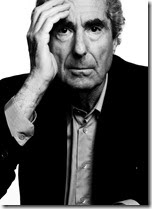 Philip Roth was born in Newark, New Jersey, which became the scene for his early novels. His father was an insurance salesman of Austro-Hungarian stock. Roth attended Rutgers University for a year before transferring to Bucknell University. He studied at the University of Chicago, receiving his M.A. in English. In 1955 Roth joined the army but was discharged after an injury during basic training period. Roth continued his studies in Chicago, and worked from 1955 to 1957 as an English teacher. He dropped out of the Ph.D. program in 1959 and started to write film reviews for the New Republic.
Philip Roth was born in Newark, New Jersey, which became the scene for his early novels. His father was an insurance salesman of Austro-Hungarian stock. Roth attended Rutgers University for a year before transferring to Bucknell University. He studied at the University of Chicago, receiving his M.A. in English. In 1955 Roth joined the army but was discharged after an injury during basic training period. Roth continued his studies in Chicago, and worked from 1955 to 1957 as an English teacher. He dropped out of the Ph.D. program in 1959 and started to write film reviews for the New Republic.
Roth, known to be both literary troublemaker and (arguably) the greatest living American writer, has been praised time and time again for his works of literature, beginning in 1959 when he won the National Book Award for his novel Goodbye, Columbus. Ten years later appeared Portnoy's Complaint, a “masturbation story” about young man's search for freedom using forbidden sex as his way of escape. The book gained a great international success and ended up being translated into several languages.
Roth has a well-known style for his use of exploration of American identity that often gets tied together with sexual and familial love. We often see parallels between his novels and his own life, and although his novels do seem eerily biographical, he has sworn up and down that they are, in fact, not.
Philip Roth has had three of his novels made into movies, including Goodbye, Columbus, The Human Stain, Portnoy's Complaint; Battle of Blood Island was adapted from the short story ‘Expect the Vandals’. Roth has also won over twenty awards for his novels, including two National Book Awards and the Man Booker International Prize. Somehow the Nobel Prize keeps eluding him though.
















